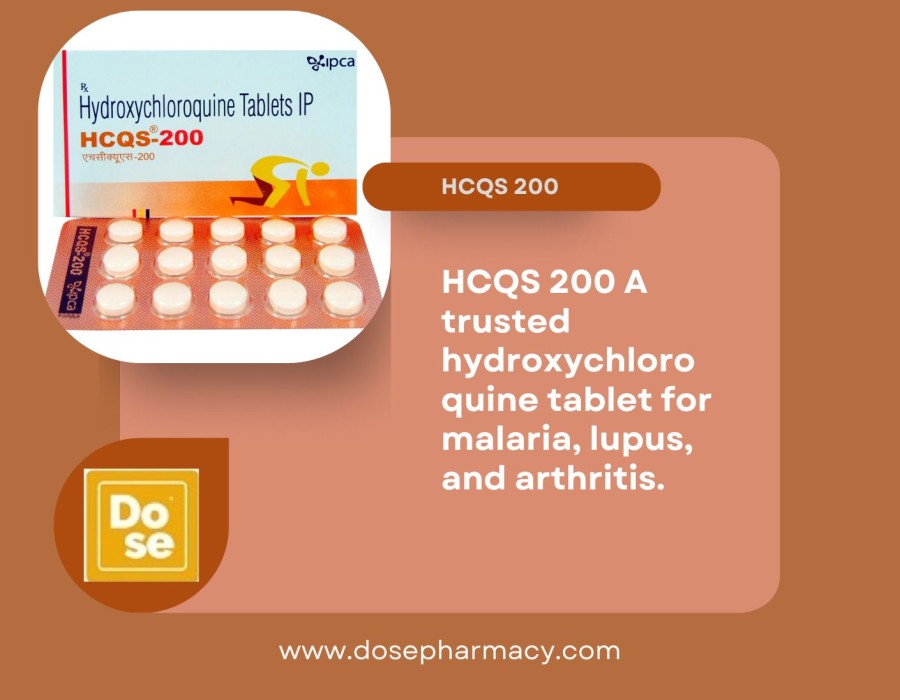Malaria is a life-threatening disease caused by Plasmodium parasites, transmitted to humans through the bite of infected female Anopheles mosquitoes. While preventable and treatable, malaria remains a major public health issue in many tropical and subtropical regions, including parts of Africa, Asia, and South America.
This article provides a clear overview of malaria's causes, symptoms, diagnosis, and treatment, including the role of hcqs 200 (Hydroxychloroquine Sulfate) in managing certain malaria cases.
Causes of Malaria
Malaria is caused by Plasmodium parasites, of which five species can infect humans:
- Plasmodium falciparum – the most severe and deadly form
- Plasmodium vivax – common and can cause relapses
- Plasmodium ovale – less common, may also relapse
- Plasmodium malariae causes chronic infections
- Plasmodium knowlesi, found in Southeast Asia, can be severe
The infection begins when a mosquito bites a person, injecting the parasites into the bloodstream. These parasites travel to the liver, mature, and then infect red blood cells, causing the characteristic symptoms of malaria.
Symptoms of Malaria
Malaria symptoms usually appear 10 to 15 days after a mosquito bite, but in some cases, it can take weeks or months. Common symptoms include:
- High fever with chills and sweating
- Headache
- Muscle and joint pain
- Fatigue and weakness
- Nausea, vomiting, or diarrhea
- Abdominal pain
- Jaundice (yellowing of skin and eyes in severe cases)
If left untreated, malaria can lead to serious complications such as anemia, kidney failure, cerebral malaria, coma, and even death—particularly with Plasmodium falciparum infections.
Diagnosis of Malaria
Malaria is diagnosed through blood tests that detect the presence of Plasmodium parasites. Diagnostic methods include:
- Microscopic examination of blood smears
- Rapid diagnostic tests (RDTs) for quick results
- PCR tests (in more advanced settings) for species-specific identification
Accurate diagnosis is essential to determine the type of malaria and the most appropriate treatment plan.
Treatment of Malaria
Treatment for malaria depends on:
- The Plasmodium species involved
- The severity of the infection
- The geographic location (drug resistance may vary)
- The age, pregnancy status, and overall health of the patient
Common classes of malaria treatment include:
- Artemisinin-based Combination Therapies (ACTs) – standard for P. falciparum
- Chloroquine – used in areas where P. vivax and P. malariae are still sensitive
- Primaquine – used to prevent relapses caused by P. vivax and P. ovale
Role of HCQS 200 mg in Malaria Treatment
HCQS 200 mg (Hydroxychloroquine Sulfate) is a well-known medication used for treating non-severe cases of malaria, particularly chloroquine-sensitive strains such as P. vivax, P. malariae, and P. ovale. It works by interfering with the parasite’s ability to break down and use red blood cells, ultimately killing the parasite.
Benefits of HCQS 200 mg in Malaria:
- Effective for treating uncomplicated malaria in certain regions
- Oral administration makes it convenient to use
- Anti-inflammatory properties make it useful in managing autoimmune disorders, too
However, due to growing resistance to chloroquine and hydroxychloroquine, HCQS is no longer effective against P. falciparum in many regions. Always consult local treatment guidelines and a healthcare provider before using HCQS for malaria.
Precautions and Side Effects
Though generally well-tolerated, HCQS 200 mg can cause side effects such as:
- Nausea and stomach cramps
- Dizziness or headache
- Blurred vision (long-term use may affect the retina)
- Skin rash or itching
Long-term use requires regular eye check-ups, especially in patients using HCQS for autoimmune conditions like lupus or rheumatoid arthritis.
Prevention of Malaria
Preventing malaria is just as important as treating it. Here are key prevention tips:
- Use insect repellents and mosquito nets
- Wear protective clothing in mosquito-prone areas
- Take antimalarial medications as prescribed during travel
- Eliminate standing water around homes to reduce mosquito breeding
Conclusion
Malaria is a serious but manageable disease with proper diagnosis and treatment. HCQS 200 mg remains a useful treatment option for certain types of malaria, especially in non-resistant regions. At Dosepharmacy, you can find trusted medications like HCQS 200 to support your health journey. Always consult your doctor before starting any treatment and follow medical advice closely.





Comments